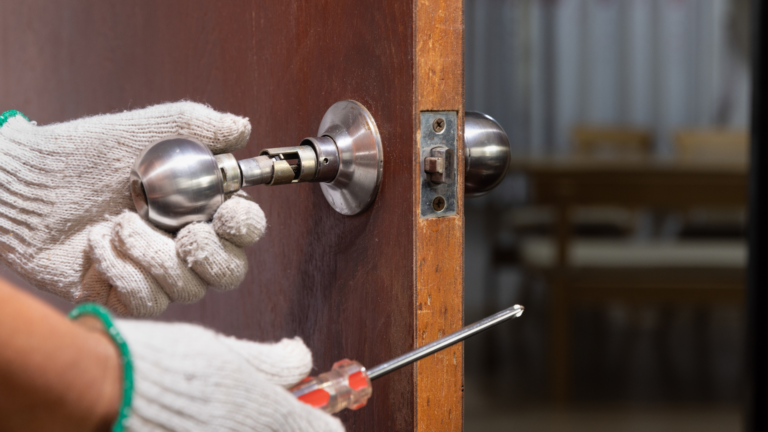Though locks are vital for home security, they can encounter problems that reduce their effectiveness. It’s crucial to address these issues promptly to keep your home safe. Here, we explore prevalent lock problems, presenting thorough insights and extra solutions to ensure your locks are in top condition.
Locks That Stick or Are Tough to Rotate
Causes
Debris buildup, rust formation, and worn internal components are the main causes of lock faults. Over time, dust, grime, and other debris may gather inside the lock mechanism, impairing its ability to operate. Due to moisture exposure, older locks or ones that are constantly exposed to the weather might rust. Continuous use can also cause internal components to wear out, which increases the likelihood of lock faults.
Detailed Solutions
If you feel comfortable removing the lock, then clean all interior parts thoroughly using a soft brush and an appropriate cleaner to get rid of old lubrication and built-up debris. Keep the surrounding area clean to keep debris out and lubricate the locks on a regular basis to prevent malfunctions.
Misalignment of Locks and Striker Latches
Causes
Doors and frames are impacted by the structural settling that occurs when buildings age. Moreover, changes in weather conditions can lead to materials expanding and contracting, potentially causing doors and frames to be misaligned.
Detailed Solutions
When you need to realign a door, first use a screwdriver to tighten the hinges and adjust shims as required. If the latch doesn’t align with the strike plate, remove it and reinstall it in the correct position, possibly using a chisel to create additional room. Additionally, upgrading or replacing weather stripping can improve door alignment and prevent future misalignment problems, ensuring the door operates smoothly and fits securely in its frame.
Keys that Are Broken
Causes
Keys can become weaker with time, especially if they are used frequently or are subjected to force, which can compromise their integrity. Furthermore, frequent use causes metal to deteriorate more quickly, raising the possibility of breaking.
Detailed Solutions
Use a key extractor tool or a small jigsaw blade to carefully catch and remove the broken fragment of a key from the lock. Ensure to inspect keys for wear often and make duplicates before they wear out. Steer clear of utilizing extensively worn keys to prevent breakage. If you are unable to extract the damaged key, consider contacting a locksmith who can securely extract it using specialized tools.
Locks with Shaking or Looseness
Causes
Due to frequent use in high-traffic areas, locks often become loose, wearing down their mechanisms. If locks are not properly installed, they can become loose over time due to insufficient initial fastening.
Detailed Solutions
Begin by removing the cover and tightening all visible screws to ensure the lock continues to work correctly. Secure the lock mechanism firmly within the door. In addition, if any worn-out components are detected, replacing the entire lock mechanism may be necessary to maintain its effectiveness.
Need a locksmith? Don't Worry!
Our expert locksmiths are available 24/7. We're here to help with all your emergency lock needs. Don't hesitate, call us now!
Key Won’t Insert Fully
Causes
Foreign items or debris have the potential to block the keyway, which disrupts the lock’s smooth operation. Moreover, a bent or damaged key may pose a barrier to full insertion, compromising the lock’s functionality. It’s important to promptly address both issues to maintain smooth key operation and secure the lock.
Detailed Solutions
Ensure your lock operates correctly by clearing visible debris from the keyway with a thin, non-metallic tool. Then, inspect the key for bends or damage and replace it with a new one if necessary to prevent future issues. Should the problem persist, consider contacting skilled residential locksmiths in Glen Mills, PA who can thoroughly inspect and clean the lock’s internal components for maximum performance and security.
Lock is Frozen
Causes
Freezing temperatures can lead to moisture within a lock freezing, causing operational difficulties. Locks in severe weather conditions may freeze without adequate weatherproofing, affecting their functionality. Protecting locks from the elements is essential to prevent moisture buildup and freezing.
Detailed Solutions
To quickly thaw a frozen lock, apply a lock de-icer spray with alcohol or similar substances that effectively melt ice. Before the winter weather arrives, lubricating the surface will help keep moisture out and putting a lock cover will protect against inclement weather. If the lock remains frozen, warm the key cautiously with warm water or a lighter before using it to melt the ice inside the lock.
By quickly resolving common problems and realizing when expert assistance is needed, homeowners can maintain the security and functionality of their locks. Regular maintenance, timely upgrades, and proper care are crucial to maintaining the integrity and reliability of the lock systems in your home.
Should you encounter issues with your home’s locks and are unable to find a solution, it’s advisable to contact residential locksmiths in Glen Mills, PA. Our expertise and specialized equipment enable us to manage a wide range of lock-related problems, improving property security and providing comfort. Please don’t hesitate to contact us right away if you need help!

